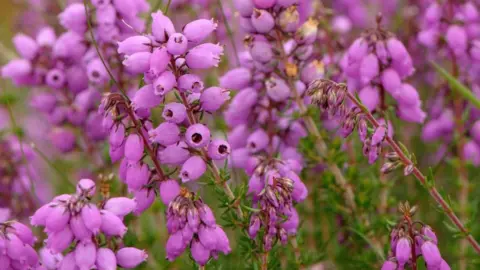Delicate plant could return to ancient woodland
 Chris Gomersall/2020VISION
Chris Gomersall/2020VISIONA delicate heathland plant could return to one of the UK's ancient woodlands as part of a new conservation project.
Erica cinerea, otherwise known as bell heather, is believed to have disappeared from Epping Forest in the 1960s.
It has struggled to survive in Essex and its only known location in the county is Tiptree Heath near Colchester.
Conservationists from the Essex Wildlife Trust will transport root cuttings, from Tiptree, to Epping Forest.
Jeremy Dagley, director of conservation at the trust, hoped the collaboration would "pave the way for future conservation efforts".
Bell heather has specific habitat needs, making it vulnerable and rare in the East of England.
It thrives on dry, free-draining acid heathland and stands out with dark purple-pink and bell-shaped flowers.
'A nice touch'
Dr Dagley attributed the brains of the operation to botanical expert Paul Fletcher, who has found a way to take cuttings without damaging the plants at Tiptree.
"Air pollution has been a big issue, particularly in London where Epping Forest is situated, and things like bracken and other faster growing plants that like higher nitrogen [in the soil], they've done better," he told the BBC.
"So something like bell heather which likes these dry, rich soils, along the tops of the hills of Essex, doesn't like lots of nutrients, doesn't like lots of fertiliser, and doesn't do well in competition with things like grasses and bracken."
The Tiptree nature reserve is a Site of Special Scientific Interest managed by the Essex Wildlife Trust and the Friends of Tiptree Heath.
"I think the small, giving to the big - it's a nice touch," said Dr Dagley.
The City of London Corporation manages Epping Forest.
Benjamin Murphy, chairman of the corporation's Epping Forest and Commons Committee, described the project as an "exciting milestone".
Follow Essex news on BBC Sounds, Facebook, Instagram and X.
